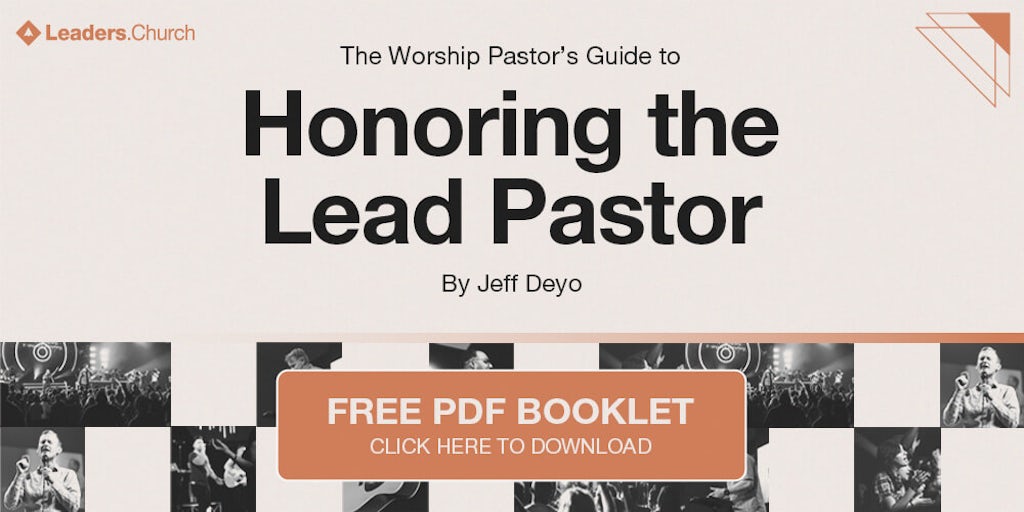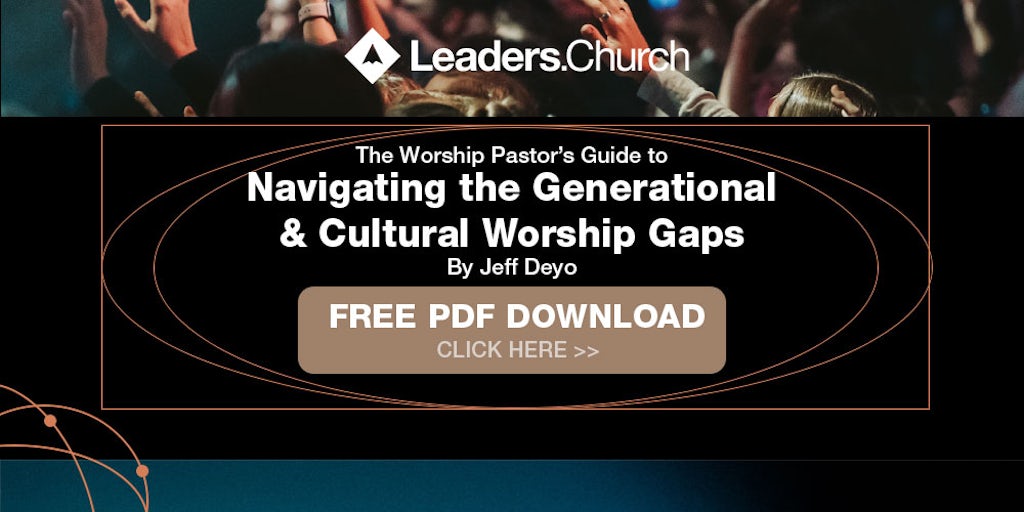
4 Great Ways to Take Your Congregation to the Next Level in Worship
Can you imagine—if people began to catch on? What if they began to realize we don’t have to come to church to worship—or, better said, what if they began to realize church isn’t the only place we can worship? What if we helped them grab on to a truly biblical model of worship that empowers them to worship inside and outside the walls of the church, and to forever “unlower” the bar on musical worship?
Ironically, that’s exactly what we were hoping to accomplish with the release of the first Sonicflood CD. Even back then, God was beginning to show us some new things (actually, old things) about the kind of worshipers He seeks—the kind of worshipers He wants His leaders in His church to help His people become.“But the time is coming—indeed it’s here now—when true worshipers will worship the Father in spirit and in truth. The Father is looking for those who will worship him that way” (John 4:23). The NIV ends this verse with “for they are the kind of worshipers the Father seeks.”
Think about that
There is a type of worshiper God seeks and a type of worshiper God rejects. Wait. What? I know. That stings a little. But it’s true. I don’t know how else to say it. If there’s a type of worshiper God desires, then it’s only logical to assume there’s also a type He dismisses. The only question is, which one are we?
He is literally probing the globe, our nation, our states, our neighborhoods, and our homes to see if He can pinpoint any true worshipers. Non-lip-service worshipers. Non-fake-it-to-make-it worshipers. Non-sing-the-song-but-don’t-live-the-life worshipers. Non-try-to-do-it-in-my-own-strength worshipers. And for us, He wants to know if there are any leaders who will train His people to be the kind of worshipers He seeks.
This excites me, because I believe God is raising up a generation of fiery worshipers for such a time as this. And—as you might expect—there are a few very important characteristics shared by these authentic, Christ-following worshipers. Characteristics that we, worship leaders, must encourage and champion again and again. (Don’t misunderstand. This is not an exhaustive list. This section focuses primarily on equipping our congregations in the area of corporate musical worship.)
The kind of worshipers the Father seeks are:
- Those who don’t require a worship leader.
- Those who don’t require lyrics on a screen.
- Those who don’t require a band or music.
- Those who don’t require a church service or a trendy conference.
1. The kind of worshipers the Father seeks are those who don’t require a worship leader.
Isn’t this what we want? Maybe. Maybe not. Who knows? Maybe if we instilled this type of culture in our churches, we’d realize we don’t really like it, because it could rob us of what we crave more than our congregation’s transformation. Recognition. For better or worse, when the congregation takes the wheel, it means I have to let go of it. And something else. Control.
The irony is, people are dying to be set free to express themselves to God. After all, they/we were made for this. Yet, we seem to hold to the idea that people are holding back, refusing to truly worship God. It’s frustrating. But sometimes I can’t help but wonder if they’re not holding back as much as we’re holding them back.
It’s like we’re afraid they’re going to grow up and not need us any longer. Heaven forbid. So we keep the leash on. It’s like we’re afraid they’re going to discover the real freedom they have in Christ. So we tighten up the training wheels. It’s no wonder insecure leaders avoid empowering church people. They’re often afraid that the people will learn to “worship” on their own and won’t come back to church.
But this is not true. We will never hurt our church attendance by raising up our everyday congregants. Worshipers who continue to need worship leaders less and less only serve to make our churches stronger and stronger.
Don’t get me wrong
I’m not implying that worship leaders aren’t important or that churches should slowly begin replacing them. Even so, as I continue to mention, the best worship leaders remain committed to working themselves out of a job. One person at a time. One family at a time. Developing our congregants into the kind of worshipers who can worship God passionately and consistently with or without us—with or without a worship leader.
The kind of worshiper God is looking for is next level. Uncommon. They’re the kind of worshiper who doesn’t require a cheerleader to get them all riled up. The kind of worshiper who doesn’t need to be coddled or pampered. Mature worshipers have already been developing a close relationship with God, and they don’t need someone to reintroduce them to their Creator every Sunday.
They are flowing with Him regularly in the secret place, as well as passionately in the public place. They’re on a first name basis and are experiencing vibrant fellowship with Him throughout the day, much like Moses did, speaking face-to-face with Him as a man speaks with a friend.
Here’s a question. What if we set our hearts on commissioning each and every person to become a worship leader? Whoa, pump the brakes. What did you say?
Let me explain
Ultimately, our greatest passion in worship leadership—besides loving God with our entire being—should be to lead people to become their own worship leader. See, I can’t actually make anyone worship God (nor do I want to). I can only show them the door. I can only point them to Jesus. I can only invite them to lift up their songs to the Almighty. And I should.
But I cannot force them to seek the Lord with all their heart, soul, mind, and strength. I can only hope to inspire them biblically to this end. This is what leadership is—service that endeavors to inspire others to step into action.
I remember when God dropped a bomb on me. I was leading worship in a large church, and the Holy Spirit directed me to commission everyone in the place to be a worship leader. But why, Lord? I thought. Not everyone is called to lead worship. Won’t this only complicate matters?
“Yes, it might. But I’m not asking you to commission them to lead worship for thousands. I’m asking you to commission them to lead worship for one. Themselves. You see, ultimately, each person has to decide according to their own will. ‘Will I open my mouth? Will I lift up my hands? Will I surrender to my Maker?’ You can only do so much, Jeff. You’re doing great, but, in the end, it is not your responsibility to make them worship. It is your responsibility to invite them to worship. They must decide for themselves.”
Wow.
So I brought the music down and shared the new revelation, and it was as if the place turned on its head. Suddenly, everyone was operating on a higher plane with a brand-new understanding of what it means to worship the Lord—for themselves. This raised the bar across the entire room as people stopped depending on the platform people to inspire them and began leading themselves into God’s relational presence.
The kind of worshipers God is raising up are the ones who don’t need to be coerced or begged. They can worship God just fine whether there’s a talented, anointed worship leader on the stage or not.
2. The kind of worshipers the Father seeks are those who don’t require lyrics on a screen.
Once again, no one is suggesting that lyrics on a screen are bad or that we should take down our sanctuary projectors and sell them on Facebook Marketplace. It’s just that true worshipers—the kind the Father seeks—don’t need a “cheat sheet” in order to worship their Creator. They know the words already, because the words emanate from hearts that worship Him all day long.
Nothing much bugs me more than when I hear people talk about running out of things to say to God after praying for two minutes. What? True Christ-followers can talk to God—and listen to Him—for hours at a time without the conversation going stale. It’s what close friends do.
I remember my first real conversation with Martha, who is now my wife of twenty-eight plus years. We were juniors at Anderson University in Anderson, Indiana. I was studying on a bench one day after class, waiting to go to my hour-long private piano lesson. Out of nowhere, an angel came floating down the hallway. I was simply minding my own business when she spoke my name. I looked up and there she was. We began talking. And talking. And talking.
She would sit down on the bench and then stand up again, wondering if she should leave me alone to study. But I closed my books and gladly encouraged her to stay. When she first approached me, it was forty-five minutes before my private piano lesson. Then it was fifteen minutes before…then five before…then five after. Oh man, I could be a little late. Then it was fifteen minutes and then twenty minutes after. Ahhhhh!
Too late. Oh well. This conversation was going too good to worry about my lesson at this point. I wasn’t about to miss this moment. Not for anything. Our conversation flowed effortlessly. We were so drawn to each other that there seemed to be endless subjects to entertain us. Endless reasons to carry on. Endless joy in every word. At the sound of her voice. At the flip of her hair. And nothing else could compete for her attention. It was magnificent! (Dramatic pause for a moment of pure gratitude.)
“The message is very close at hand; it is on your lips and in your heart” (Romans 10:8). Where do the lyrics for spontaneous worship originate? From within. For believers. We draw on the very words God has written on our hearts. Words that were put there by Him for Him—words that can be drawn out from the reservoir that God created deep in our hearts. But if we don’t know Him, we won’t know the words. And we quickly run out of things to say.
Trust me. I’m not suggesting the time of the known song is coming to an end—that we should only sing spontaneous songs or that the congregation should somehow memorize all the lyrics. I’m simply saying that for those who want to be the worshipers the Father seeks, there shouldn’t be a shortage of ways to express our adoration to Him. And we shouldn’t fear shutting down if or when our church projectors shut down.
The words of praise and worship are alive within our hearts as we continue to seek Him daily. Think about it. We don’t require a script to pray when someone asks us to speak to God to close a meeting. Likewise, the worshipers the Father seeks have no issue worshiping God just as passionately with or without lyrics on a screen.
3. The kind of worshipers the Father seeks are those who don’t require a band or music.
How did you feel in chapter 11 when I said, “The presence of God isn’t in the music”? You probably nodded your head. You knew that. But quite possibly, it was something you hadn’t put voice to yet.
It’s true, though. We get it. Whether or not we have professional experience in this arena, it’s easy to understand that when the music stops, God doesn’t disappear. It’s not as if, just after the band plays its final chord, God is suddenly inaccessible. As if His ability to engage with His people depends on soft, flowy, piano music. Ha! God’s presence is available to us whether we have the perfect music emanating from the keyboard or not.
We used to jokingly refer to the quiet, warm pad sounds on our keyboard as “the Holy Spirit,” because it was almost as if when we began playing these sounds, God’s ability to move (or our ability to sense His movement) increased exponentially. As if God only touches people when this type of music is playing. But no. He is with us when the music is playing and when the music fades. God’s presence is not found in the music, but is increasingly realized as we engage with Him in close fellowship. In real-time relationship.
This is where we find ourselves basking in His manifest presence. God’s presence is not found in the music, but is increasingly realized as we engage with Him in close fellowship. In real-time relationship. It’s scary to think, but it is possible to sing the songs, enjoy the band, feel the music, and still miss out on encountering God. His presence. Personally.
I even wonder sometimes if the simple joy of having a great band can backfire. It’s a catch twenty-two. People might enjoy our music so much that they forget to enjoy God—the One who made the ones making the music. Of course, this doesn’t give us permission to encourage the band to stop playing with excellence or with creativity (or entirely), because the opposite can be true as well.
Even so, let’s forget about the band for a minute. The kind of worshipers the Father seeks can worship just fine with or without a band—no matter their skill set—simply because they’ve discovered that the music isn’t the point. They aren’t focused on the music itself so much, because they see it for what it is: a tool. A tool to help them connect with their heavenly Father, as well as further proof that the Creator of the universe deserves beautiful praise for dreaming up this thing we call music.
Part of our role as the worship leader is to help our church community become aware of these important under-the-radar truths through teaching. In this way, we spur them on to maturity.
4. The kind of worshipers the Father seeks are those who don’t require a church service or a trendy conference.
Have you noticed we’ve made a bit of a return to the church of old? Whether forced upon us or simply misunderstood, many churchgoing Christians have bought into the idea, all over again, that there is a certain physical place where God can touch us better than others—that God’s healing or prophetic touch is tied to a location, a place often referred to by many well-meaning leaders as “God’s house.”
Jesus addressed this idea with the woman at the well in John 4. She, too, was convinced the issue was a “where” issue when she asked Jesus to clarify which place was better suited for worship, Mount Gerizim or Jerusalem. Yet, as Louie Giglio puts it in his book, The Air I Breathe, “Jesus took the subject to another level, answering her simple ‘where’ question with a riveting ‘who’ answer.”
Post-resurrection theology erases the idea that worship is connected to a place and helps us understand instead that it is connected to a person. The kind of worshipers the Father seeks realize the poignant truth from Acts 7:48: “The Most High doesn’t live in temples made with human hands.” They understand that God’s power isn’t available to us more readily in one building over another, or only in certain revival services in certain parts of the world.
They realize the truth: that God’s power is tied to His people, because His people are His temple—the Temple of the Holy Spirit—and He lives in His people, not in a church building. The church building is not God’s house. We are. And while this may be a tiny deception, it is one that needs to be expunged—once again, from the hearts of many misinformed churchgoers. “Don’t you realize that all of you together are the temple of God and that the Spirit of God lives in you? God will destroy anyone who destroys this temple. For God’s temple is holy, and you are that temple” (1 Corinthians 3:16–17).
Wow. Beautiful.
What are you saying, Jeff? That people don’t need to go to church? Of course not. I’m just echoing the words of God to remind us that He is not limited only to moving within a church building. His presence isn’t housed within a temple or contained within the structure of a perfectly ordered, perfectly crafted worship service. He is not limited to our attempts to confine Him, and we must help our church family recognize this fact.
He is in the street. He is in your house. He is in your car. He is at the beach. He is on the plane. He is in your office. Why? Because He is in you wherever you are.
The next-level worshipers God is raising up are those who understand they can worship very well in a church building or on a field. On a mountain or on a train. In an eight-hundred-year-old cathedral or at a ballpark. In a cubical or in a jail cell.
All of the above.
Here’s the real question
What if the day comes where people are thrown into prison for following Christ? In the USA or a similar country? This, of course, is already happening in many places around the world. Why not here? What will we do if there aren’t any video projectors, worship leaders, bands, sound systems, or services in these prisons? How will we function? How will we seek His face? How will we worship Him?
This might be hard to fathom. But is it really that inconceivable?
Shoot, we experienced a microcosm of this in 2020 with COVID-19, didn’t we? Many of our families struggled significantly to engage with the musical worship in their homes, in the same way they do at church. Doesn’t this reveal a little something about where we are?
In these situations, Jesus finally has us where He wants us, fully exposed—and fully liberated from empty man-made traditions where we exalt the methods, manner, or means of worship. Where we can now exalt the King Himself. Then and then only is the worship bar “unlowered” to the place it was originally intended to be.
Other Worship Leadership Articles:
6 Steps for Increasing Worship Team Effectiveness
8 Ground Rules to Run an Effective Worship Rehearsal
8 Things for your Worship Team to Rehearse
Your Guide to Smooth Transitions Between Worship Songs
7 Compelling Reasons to Avoid Chasing Culture and Style When Leading Worship
5 Biblical Reasons for Spontaneous Worship in Your Church





